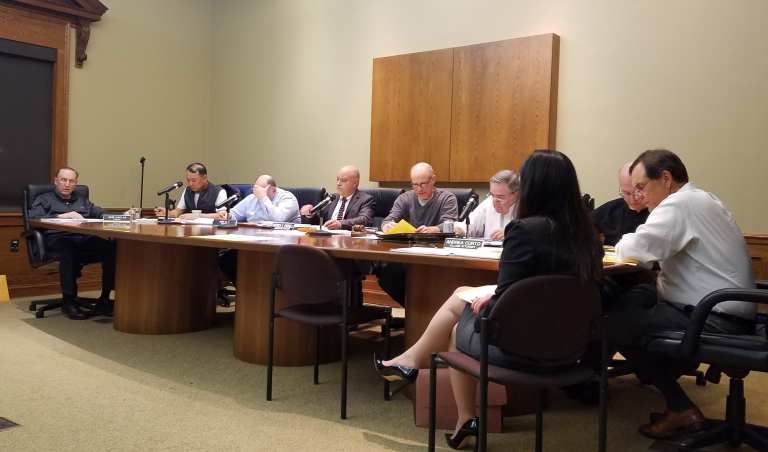
By Maylan L. Studart
The Village of Lake Success Board of Trustees approved capital improvement projects and discussed taxes and money-saving efforts at a meeting on Jan. 14.
The board also announced the day for residents to bring their tax grievances, improvements to the golf course and discussed contractual agreements and cell node installation, among other agenda items.
The day for residents to address their tax grievances is Tuesday, Feb. 19. A committee will be available from 4 p.m. to 8 p.m. for people to discuss their tax assessments with the village.
Mayor Adam Hoffman said he looked at Nassau County’s new tax assessment for 10 or 15 of village residents’ addresses and found taxes “didn’t change much” compared with last year. He said he spoke to the mayor of Kensington, who was upset most of her residents’ taxes went up considerably.
The board also approved a capital improvement project to update golf course restrooms and course drainage system.
The updated bathrooms will have new entry doors, flooring, walls, lighting and exhaust fans for winter use, among other improvements, trustees said.
The golf course will have a new drainage system where putting greens on inclines won’t be flooded, which should prevent rotting of the grass. The drainage project will be done at two different times so as to not disrupt golfers. It is likely to take a day and a half in March and once again in November, when use of the course is lower.
The Golf Commission decided this project needed to be done after assessing the property.
“It’s part of saving the golf course with all the other projects,” said Trustee Gene Kaplan.
“We’ve done some bigger projects on the golf course, they’re capital in natural, improves the community, so it goes in the general fund,” Hoffman said.
The project is similar to a drainage project completed in 2005 and will cost $40,000 to be paid with general funds now to be reimbursed by bond anticipation notes.
The board also approved the removal of a number of trees from the golf course, after recommendation from the Golf Commission. Some trees that are damaged or dying and causing issues like lifting car paths and preventing sun on certain parts of the greens will be removed after being selected by an arborist, they said.
Bond anticipation notes were also approved to buy new lightly used golf course maintenance equipment that will result in the village saving money and make servicing the course more efficient.
“That will save us a lot of overtime,” said Trustee Sugnam Peter Chan.
A few cost-cutting measures were also discussed, one of them being the cost of valet service for the golf course.
“The way valet is being used right now is minimal, even in the weekends it’s about 40 cars,” said Kaplan, who is also on the Golf Commission. “But people need help in and out of cars with walkers, to go in and out of the building.”
Trustee David Milner said the valet contract is about $50,000 per year and that based on the hours valets work, it turns out to cost $5 per person for the year. “It’s a nice amenity to give older people,” said Milner, after noting a lot of the patrons need mobility assistance in and out of the buildings.
“To me it’s more of an amenity for the village than it is for coffers,” said the mayor, who also said he doesn’t want to end the service because he knows how important it is for residents. “We’ll figure out how we’ll pay for it with the general funds,” he said.
The board approved a motion to keep contracting for valet service as a village responsibility and moved the valet contract fee to the general funds budget. The trustees are now tasked with negotiating new terms with the valet contracting company.
A minor contract change with the Policeman’s Benevolent Association was approved by the board. Once PBA leadership approves the last draft, it will be ready for the mayor to sign.
The final terms of the contract with the Policeman’s Benevolent Association were approved by the board a couple months ago, but the contract was rewritten to change the language to make it more readable.
“Changes in language, but no change in terms,” said Trustee Stephen Lam, who is overseeing the project.
The village continued discussing terms of a master plan that will address the implementation of cell nodes throughout the village. Cityscape, a consultant for the village, is helping draft the legislation and has put the price tag on the project at $40,000, according to village Attorney Andrea Curto.
Residents condemned the proposal at a crowded public hearing in October, questioning the project’s necessity, voicing concerns about property values and pushing elected officials to fight back.
“The way the federal government is jamming this down everyone’s throat, I wonder how much a master plan can help us,” said village Administrator Patrick Farrell.
Representatives from ExteNet, which is representing Verizon, outlined nine of the 13 nodes being considered for installation on poles in various parts of the village. This is meant to boost cell coverage and increase data capacity in the area, they said, and create a “better mobile experience.”
The board said it hopes to dictate how many poles are used, and the height and location of the cell nodes to address residents’ concerns.
The board tabled a vote to provide a tax certiorari payment for a settlement awarded to We’Re Associates, a building construction and management company.
According to the board, the village overtaxed We’Re Associates’ properties in the 2014, 2015, 2017 and 2018 tax seasons and a court ordered the village to pay the $209,000 settlement by April 8. The vote to approve the settlement will be revisited later.
Finally, Trustee Lawrence Farkas reported that the Parks Commission budget is “doing well,” having spent $175,600 compared with last year’s $203,000. The department spent $169,000 in 2016 and 2017 and $199,000 in 2015.






